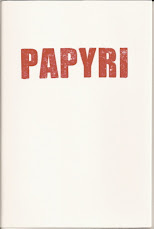1954:
William Forrester published Avalon Landing, his first novel, while still in his early twenties (his only other recorded publication is a piece about baseball, “A Season of Faith’s Perfection,” New Yorker, 1960). Since then, and since the deaths of his brother, mother and father in swift succession, he has been living in seclusion in a small apartment in the Bronx, linked to the outside world by a pair of binoculars and regular weekly deliveries from his long-suffering publishers.
For, while other writers set out to write “the great twentieth-century novel” (a variant on the Great American Novel?), Forrester succeeded. The book is a Pulitzer-Prize-winning literary phenomenon, still in print after fifty years, and permanently on loan from all the public libraries in New York.
At any rate, that’s the central premise of Gus van Sant’s film Finding Forrester, in which Sean Connery enjoys himself rather too thoroughly playing the crusty old genius. (A Scottish birthplace had to be hastily cobbled up to explain the accent, even though Forrester is clearly intended to be as American as apple pie. The film abounds with ritual invocations of baseball, Yankee stadium, and other American pop-cult icons).
It’s an somewhat improbable tale, based mainly, one would conjecture, on the post-Catcher in the Rye career of J. D. Salinger (seen previously in the Kevin Costner vehicle Field of Dreams).[1] I suppose what interests me about it is the way it offers a fully-fledged “Writer” stereotype for our examination.
Americans have always had a fascination with the writer-recluse. Emily Dickinson, Thomas Pynchon … even H. P. Lovecraft. If they’re not bona fide recluses, they’re eccentric in other ways: repressed (Henry James, Marianne Moore); alcoholic (Faulkner, Berryman, Carver); hospitalised (Robert Lowell, Ted Roethke); suicidal (Hemingway, Plath, Sexton), or just downright dangerous (Fascist Pound, Junky Burroughs …).
Why does Forrester never go out? Why does he never publish anything? Agoraphobia would seem an obvious diagnosis when we see him swaying dizzily in the doorway of his apartment – but a visit to home plate with his new buddy Jamal soon cures that. It turns out to be because, after he published his book, people talked about it too much, and in too intrusive a way: “I decided I’d never do that again.”
Yep, just like poor Keats, it was those goddamned critics who scared him off, and who’ve made him shut himself away from the world, filling filing-cabinets with unpublished stories.1. Based, in its turn, on W. P. Kinsella's 1982 novel Shoeless Joe, which names Salinger explicitly, rather than just hinting that the "writer" Costner goes out to find might be him.
Poems, Imitations & Translations
Thursday
Case Studies (1):
Subscribe to:
Post Comments (Atom)








.jpg)
No comments:
Post a Comment